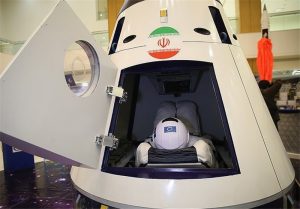
In an unsurprising move, the Iranian government has officially abandoned Tehran’s ambitions to send humans into space.
According to Iranian news agency ILNA, Mohammad Homayoun Sadr, the deputy head of the Iran Space Agency (ISA), made the announcement citing the extremely steep cost of a human spaceflight programme that he estimated was somewhere between U.S.$15-20 billion over 15 years. This price-tag is onerous for a well-functioning large economy, never mind one that is laboring under international sanctions, endemic corruption, failing economic policies, and lack of reforms as is the case with Iran.
The ISA had previously aimed to launch its first astronaut in 2025, and had made initial preparations on a human-rated space capsule that was publicly displayed for the first time in the summer of 2016. Prior to that, the ISA had launched a primate named Pishgam (Farsi for Pioneer) into space in 2013, under the presidency of Mahmoud Ahmedinejad.
Such was Ahmedinejad’s enthusiasm after Pishgam’s sub-orbital flight, he declared he declared at the time, “I’m ready to be the first Iranian to sacrifice myself for our country’s scientists.”
It is thought that the Iranian human spaceflight programme was the brainchild of Ahmedinejad, and there have been rumours that many ISA engineers and scientists expressed resentment at his focus on grandiose space projects rather than the unexciting yet critical work of space science, satellite development, and satellite applications.
Once Ahmedinejad left office the human spaceflight programme was not abandoned but was certainly not publicised either, even though it is known that President Rouhani is skeptical of the whole idea. The official cancellation of the programme comes on the heels of Rouhani’s successful reelection to the Iranian presidency. It is likely that Rouhani’s replenished political capital has allowed him to erase expensive yet populist programmes, such as human spaceflight, that are often the political hallmark of Iranian hardliners.
It is also possibly a signal to the Iranian public that serious and much needed economic reform is in the offing.
Commenting on the cancellation of the Iranian human spaceflight programme, the chairman of the Eurasia Group, Cliff Kupchan, told The New York Times, “If they’re going to sustain robust growth, they need to spend on productivity-enhancing investments and creating jobs…Nice-to-have, prestige projects will be vulnerable and this space project seems to be a casualty.”
Charles P. Vick, an independent analyst, intimated that ISA engineers and scientists may have also been overwhelmed at the sheer complexity and scale of building a human spaceflight programme, claiming that ISA engineers encountered “a lot of technical problems. They were really trying to take on something that was far larger than they perceived. Dreams are wonderful, but dreams have to come down to reality.”
The Iranian decision to abandon its human spaceflight programme also comes as the United Arab Emirates has declared its intention to train its own astronauts, though the UAE has no intention to send humans into space itself. Instead, other countries such as China, Russia, and the United States will launch UAE astronauts into space, significantly lowering costs to Abu Dhabi.
Iran has had discussions with China about the possibility of sending Iranian astronauts to the Chinese space station once it is operational. The cancellation of the Iranian human spaceflight programme does not preclude the possibility of Iranians going to space in the future, but it does end the possibility that they will go there using their own launch vehicles and capsules.
Original published at: https://spacewatch.global/2017/06/iran-abandons-human-spaceflight-ambitions/
 SpaceWatch.Global An independent perspective on space
SpaceWatch.Global An independent perspective on space

